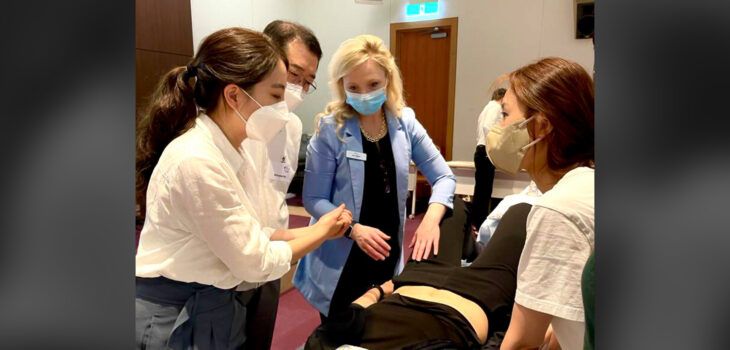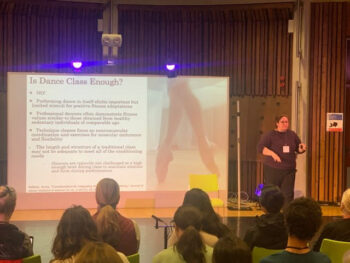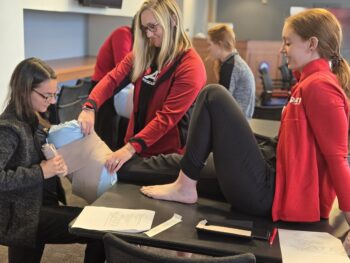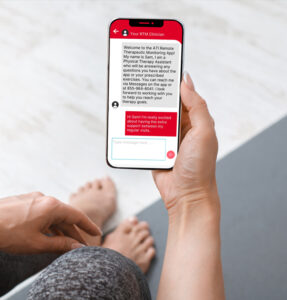 Clinical Excellence
Clinical Excellence
Pelvic Health in South Korea
Kari Melby, MPT, is a clinician who wears many hats. While her primary role is serving as ATI’s Senior Director of Specialty Services, Kari also teaches at multiple universities. In addition, she serves as an instructor with the American Physical Therapy Association’s (APTA) Academy of Pelvic Health. Her role with the APTA has taken her all over the country and, recently, internationally – where she traveled to South Korea to share her expertise.
A First in Formal Education
Through the Academy of Pelvic Health, Kari and a small group of colleagues first traveled to South Korea in 2022. It was the country’s first formal education session in pelvic health. During the visit, the group covered a wide array of topics including:
– Anatomy
– Patient history
– Physical examinations
– Treatment interventions
– Pelvic floor dysfunction prevention
“We were really impressed with the physical therapists in South Korea because technically they’re pioneers,” Kari said. “They’re the first to get out there and educate their communities and their referral sources.”
The session was a success for Kari’s team and those who attended. As a result, the Academy of Pelvic Health team was invited back for a second time in 2023.
Repeating Success
On the team’s second trip to South Korea, additional speaking engagements were added to the team’s calendars. In addition to repeating the three-day course they had done in 2022, The Soeul Society asked Kari and the team to speak at the Korean Physical Therapy Association conference.
The opportunity was exciting, although not without its challenges. Over a thousand therapists were in attendance for the “Advancement of Obstetric & Pelvic Health Physical Therapy” presentation. But it was not the sheer number of attendees that posed the direct challenge – it was the language barrier.
Translators were needed for both the conference presentation and the course to be successful. Although the translator provided that necessary bridge between the presenters and the audience, Kari and her team still had to be very careful with their information.
“The first time I went there [in 2022], I was nervous not knowing how it would work. It was all live translation, so you had to be very concise with your language,” Kari said. “We would speak in English, and we each had our own translator.
“In the end, it turned out great,” Kari added. “Ultimately, it is really cool to see that PTs have this unwritten language. You just understand each other, even in multiple languages.”
Nurturing Development in Herself and Others
Kari has spent many years growing her knowledge and skill set within pelvic health. As a PT student, she knew that she wanted to get into pelvic health because of her interest in pregnancy.
“Pregnancy is fascinating, and the more I learned about it, the more I learned so many individuals experience pain during pregnancy,” Kari said. “[These individuals] were told to just deal with their pain and that it would be better once they’re no longer pregnant. And I thought, ‘no,’ that doesn’t make a lot of sense to me.”
Over her career, Kari has slowly dedicated more time to pelvic health instruction. While she described patient care as her “number one love,” she knew she could make a real impact by helping other clinicians learn about care delivery. By instructing other clinicians, her efforts created a ripple effect allowing for even more patients to find the care they need.
Interested in Pelvic Health
There is growing interest in pelvic health, but it can seem difficult to get into. For students who are curious about this specialty, Kari offered this advice for interested clinicians:
- Get started with the coursework. A few of the main governing agencies that provide this education have opened their coursework to students.
- Try to find a clinical rotation. If a full rotation is unavailable, try to do a split rotation.
- Look locally. See who the pelvic health clinicians are in your community. Ask if they wouldn’t mind you coming in to shadow or observe.
In the end, pelvic health is a passion and ongoing education is key to clinician success. “I would get as much exposure as you can,” Kari said as a final word of advice, “because when you start to feel more comfortable and confident is when you start to have your own caseload of patients.”
[need to include link to APTA Academy of Pelvic Health website per Kari]











